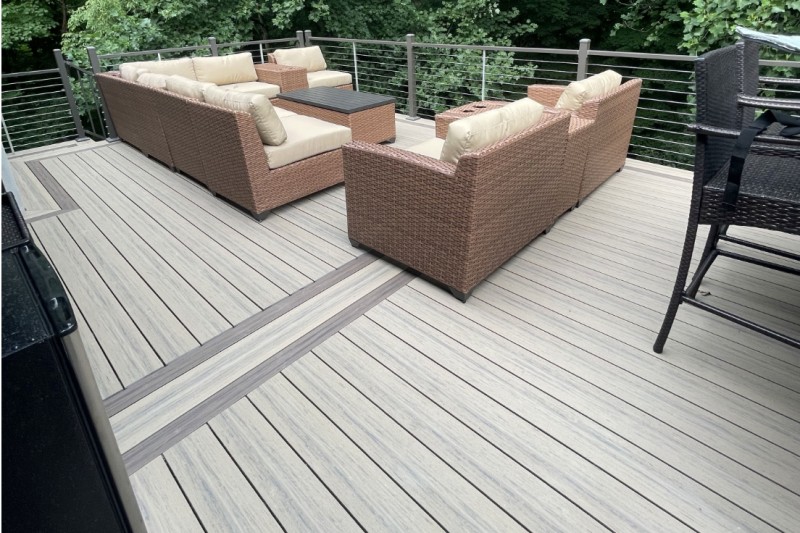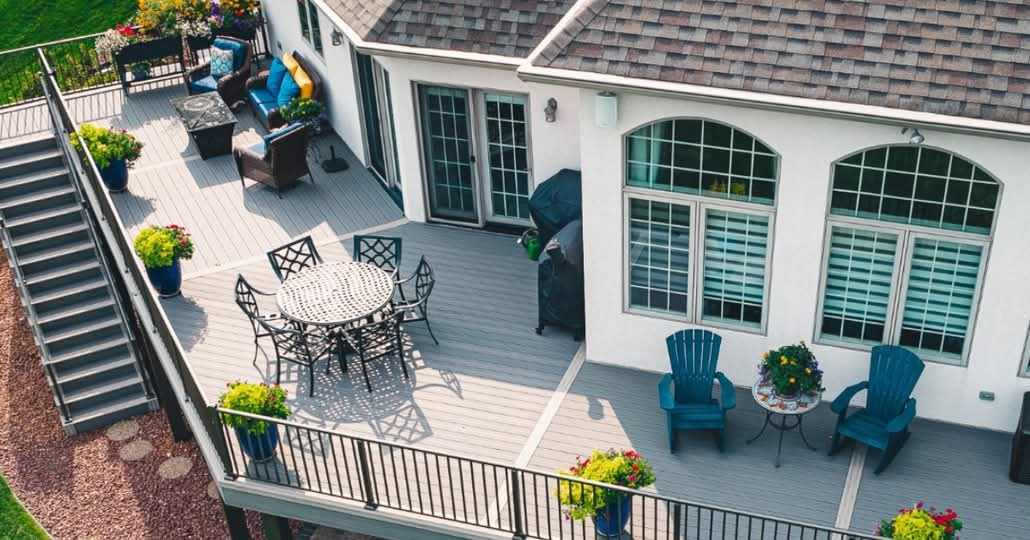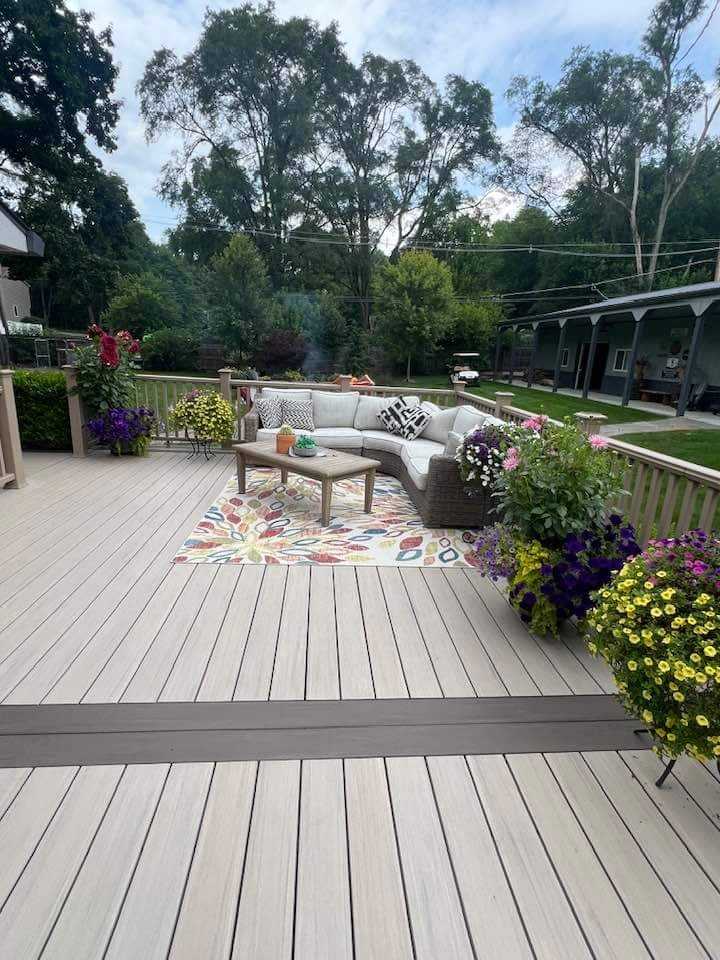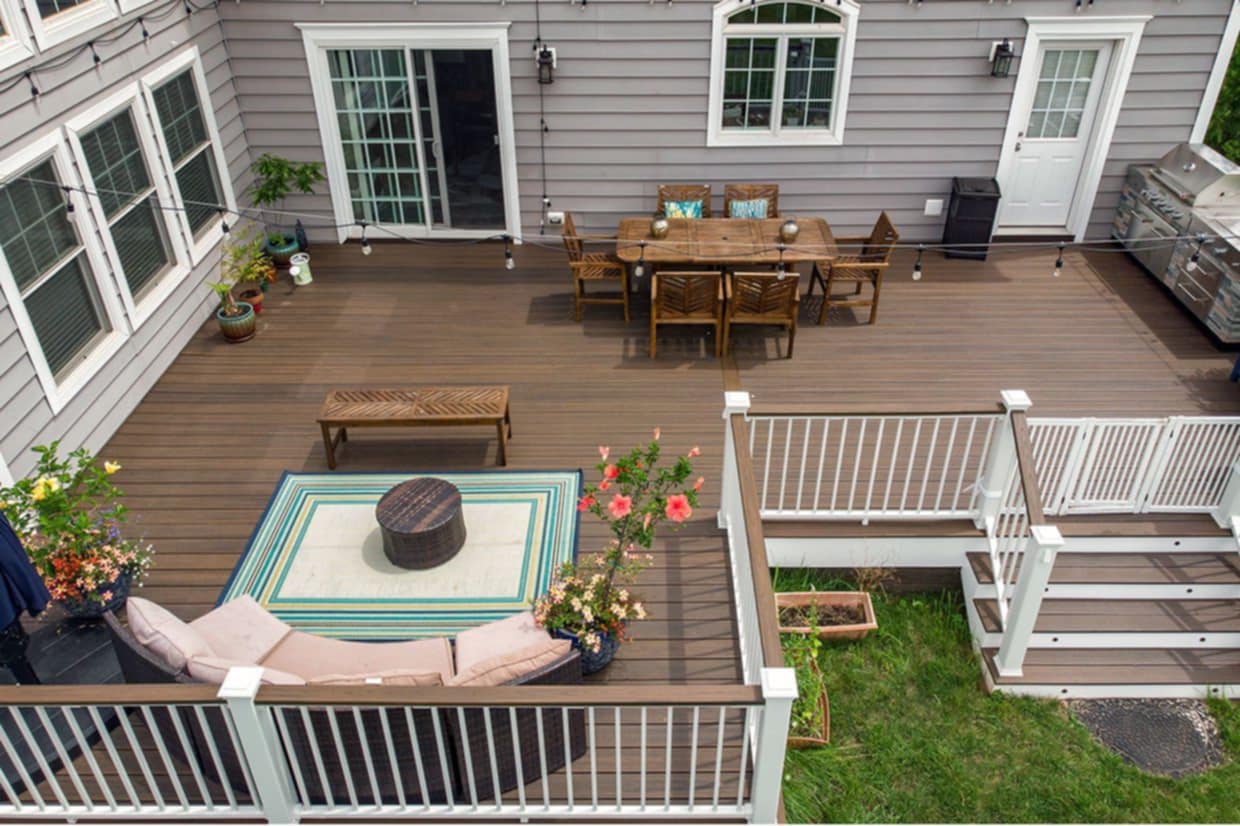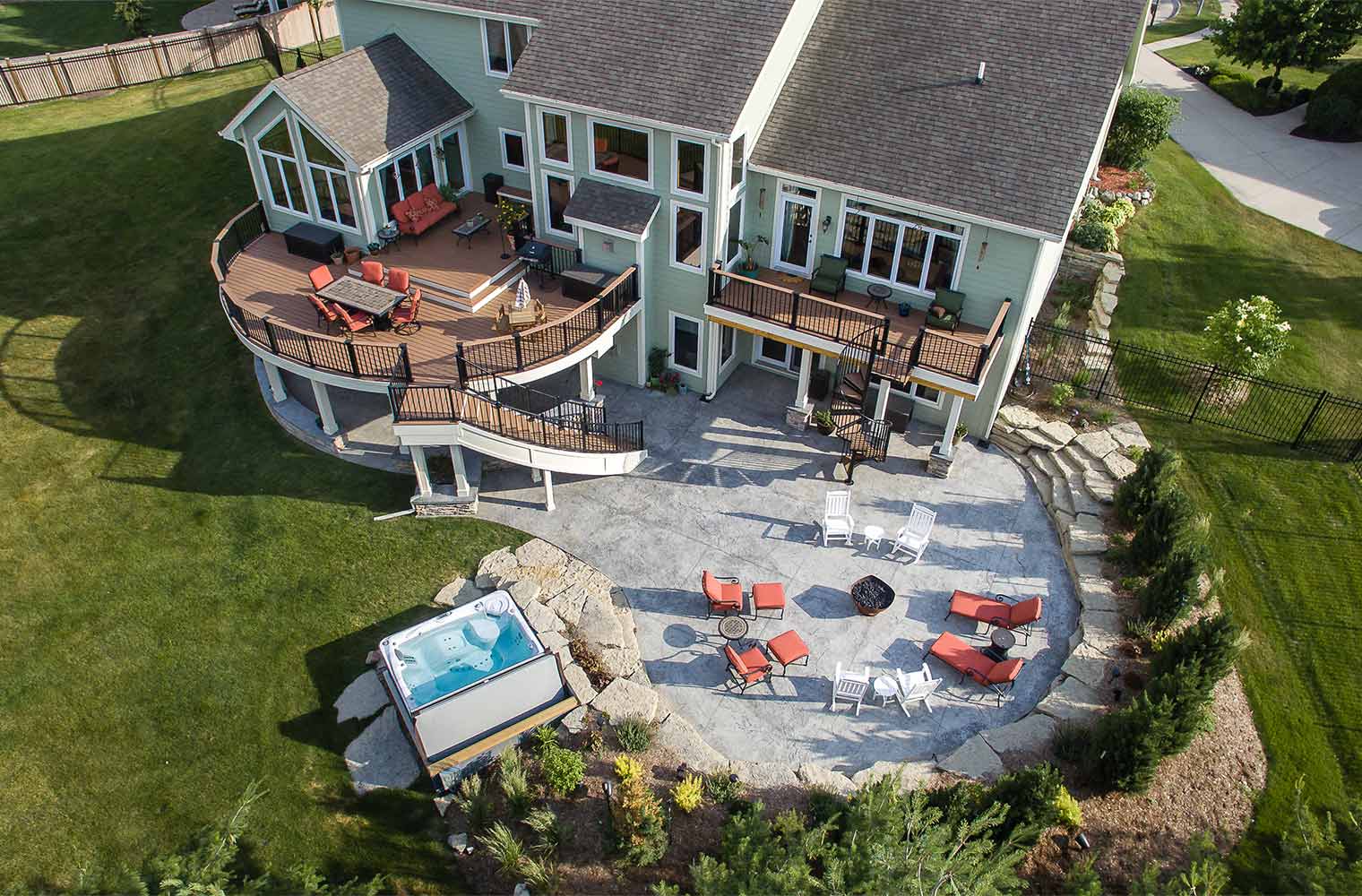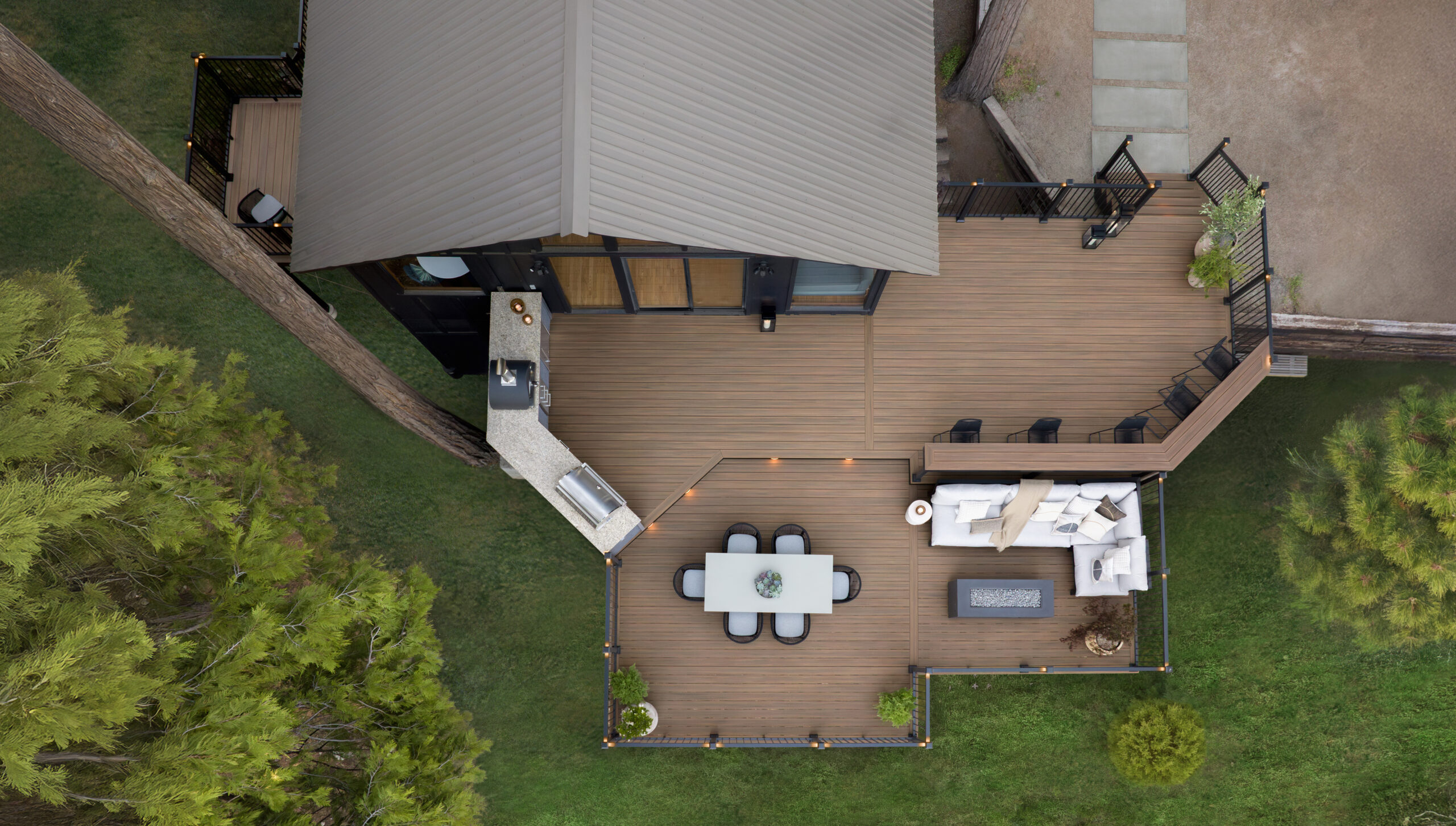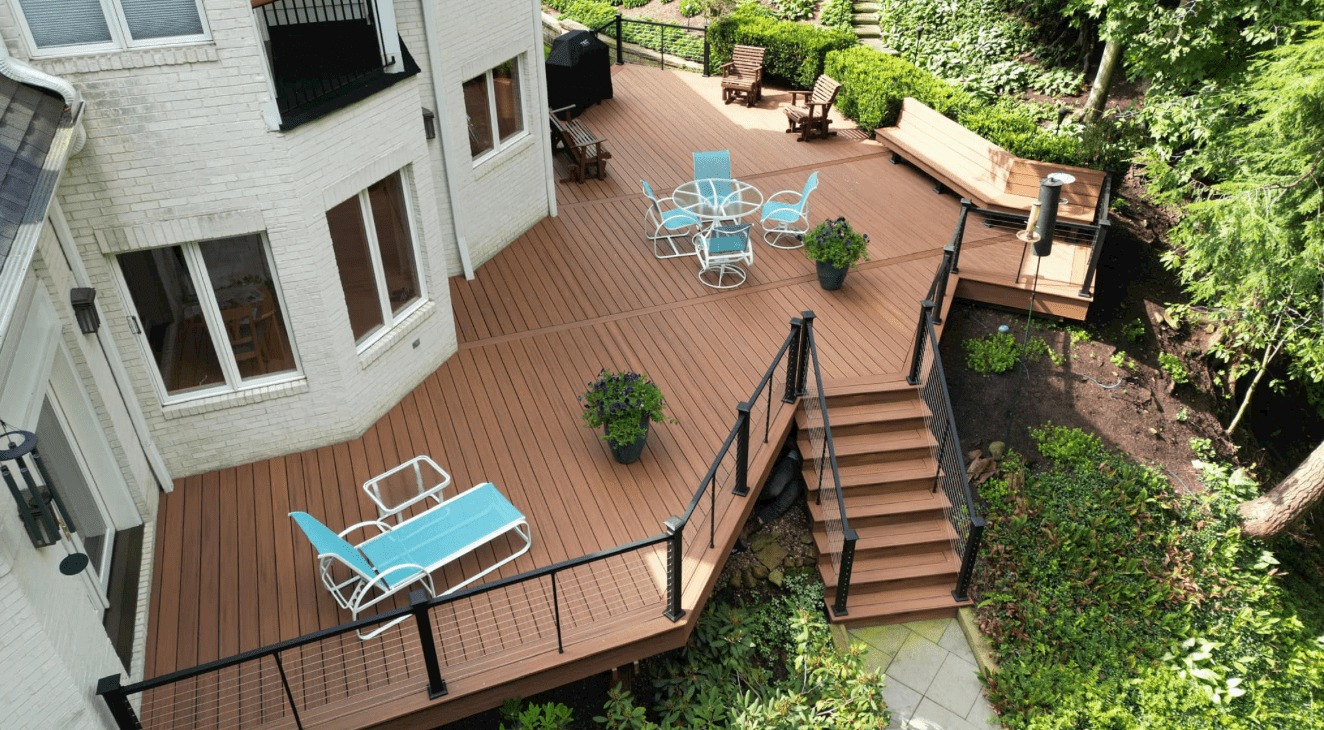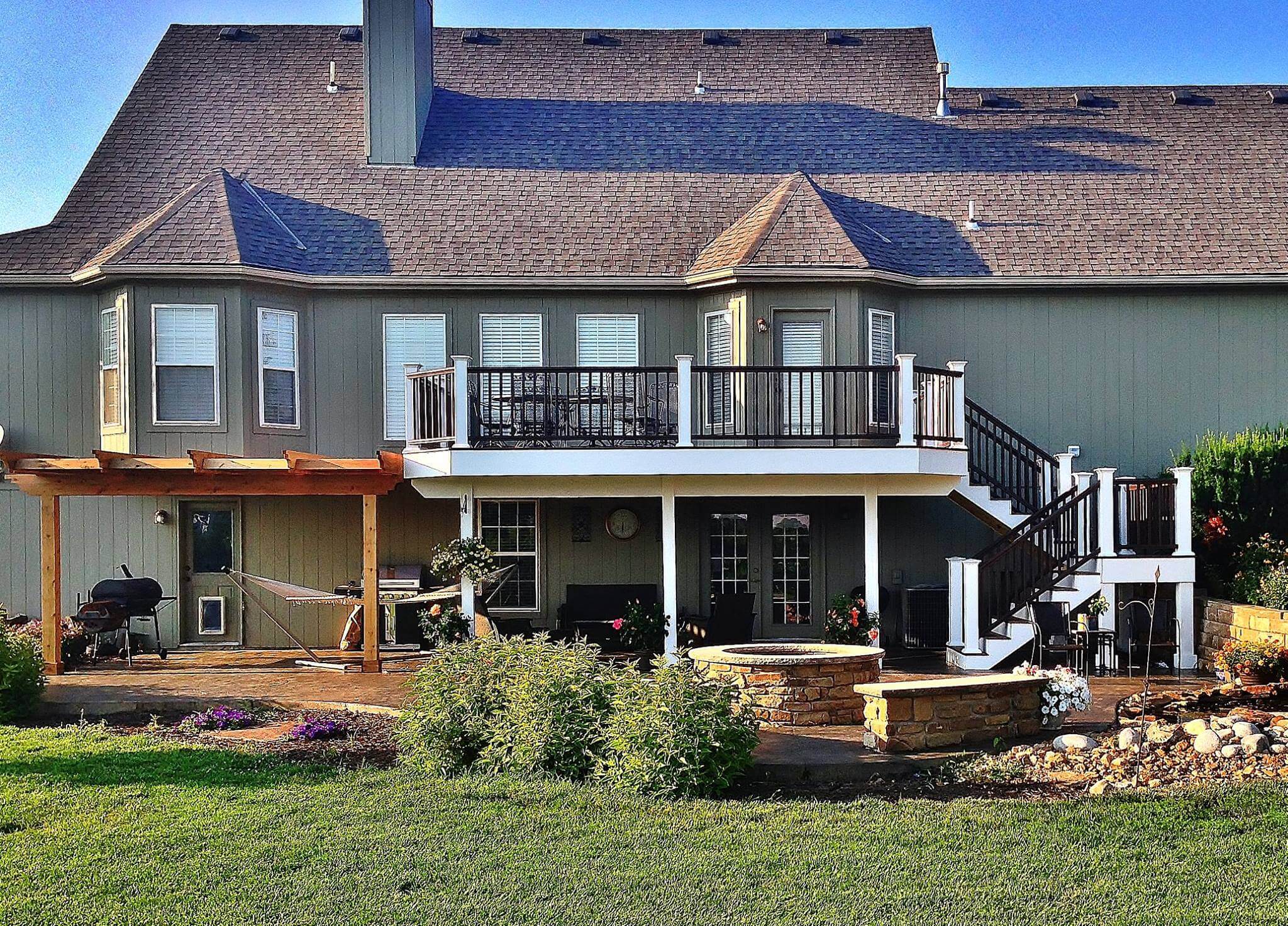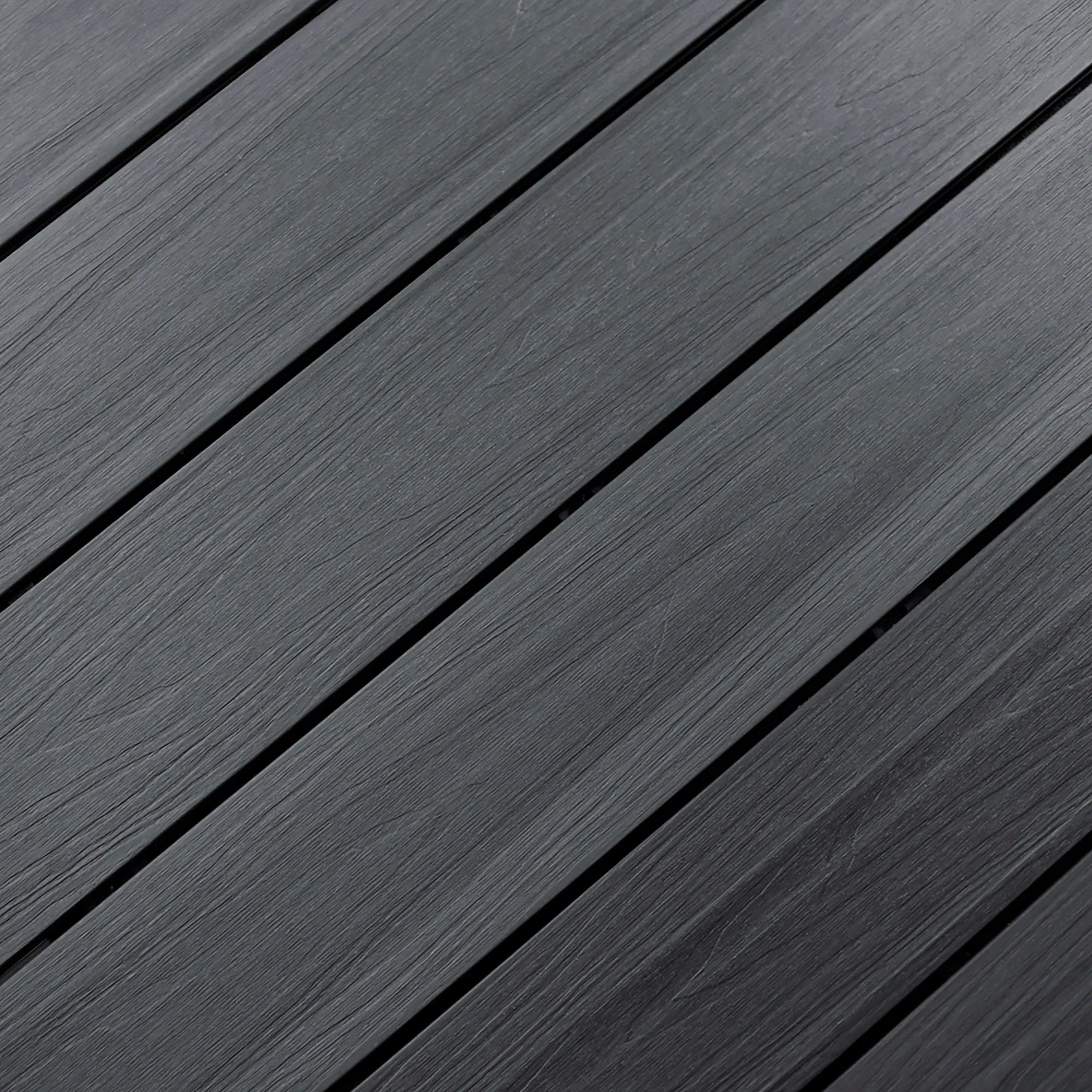Pros & Cons of Composite Decking
Have you considered building a new composite decking but wonder what the advantages and disadvantages maybe? Read more and we will explore the pros and cons of composite decking products.
Pros:
Requires Minimal Maintenance
Composite’s main advantage is that it’s low maintenance. This means composite doesn’t need to be constantly sanded, pressure washed, sealed, stained, or repaired.
Easy to Clean
Composite is easily cleanable with just a hose and soap. It is recommended to use composite deck cleaner or dawn dish soap and a soft bristle brush with a hose.
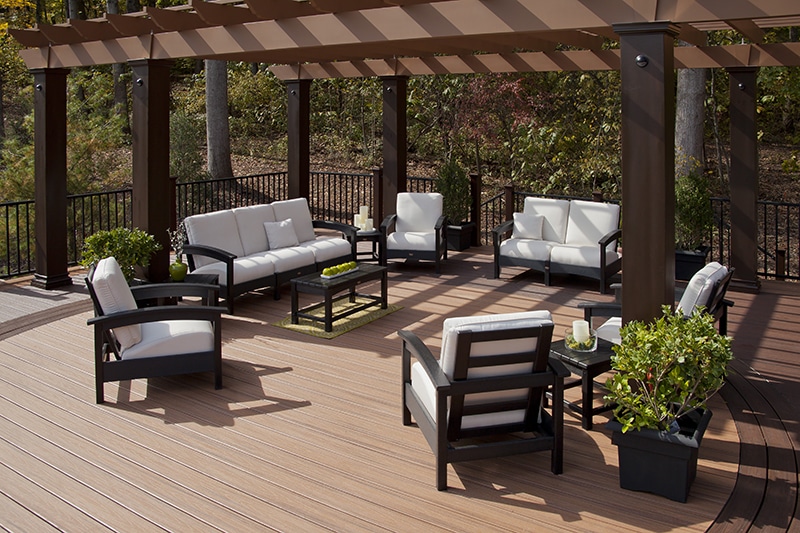
A Price Point for Every Budget
There are now a lot of different choices when it comes to composite decks. From entry level decking to the higher end composites with so many brands and collections, it is easy to find a composite decking that fits your budget and style.
Hidden Fasteners
One of wood decks safety hazards are popping screws. With most composites the boards come with grooved edges to eliminate those exposed screws with using a hidden fasteners. There may be some areas such as miters, picture frame boarders, and breaker boards that hidden fasteners cannot be used, in this case Cortex plugs can be used to hide and protect the screw heads. Unfortunately, this doesn’t apply to most scalloped deck boards such as Trex Enhance, there will still be exposed screws (color matched) as the board thickness is not enough for the cortex plug. This may be something to think about when choosing your decking selections.
Consistent Decking Dimensions
This is important when it comes to when a deck is wider than the standard board lengths. We recommend using a breaker board for a cleaner, more pleasant look than staggering decking. With consistent widths of composite decking, the decking gaps will line up perfectly on both sides of the breaker board, where on the other hand traditional wood decking is not guaranteed and will have variation in sizing, thickness and wetness. Wood like green pressure treated pine (most commonly used for decks) comes from the mill wet from the treatment, as it seasons it shrinks, this creates more inconsistency.
Water Resistant
It has a protective cap that protects the decking from absorbing water. Some brands like Deckorators or Moisture shield are better for water resistant than others and rated for water contact. The water absorption in decking or wood is what causes rot, mold and mildew.
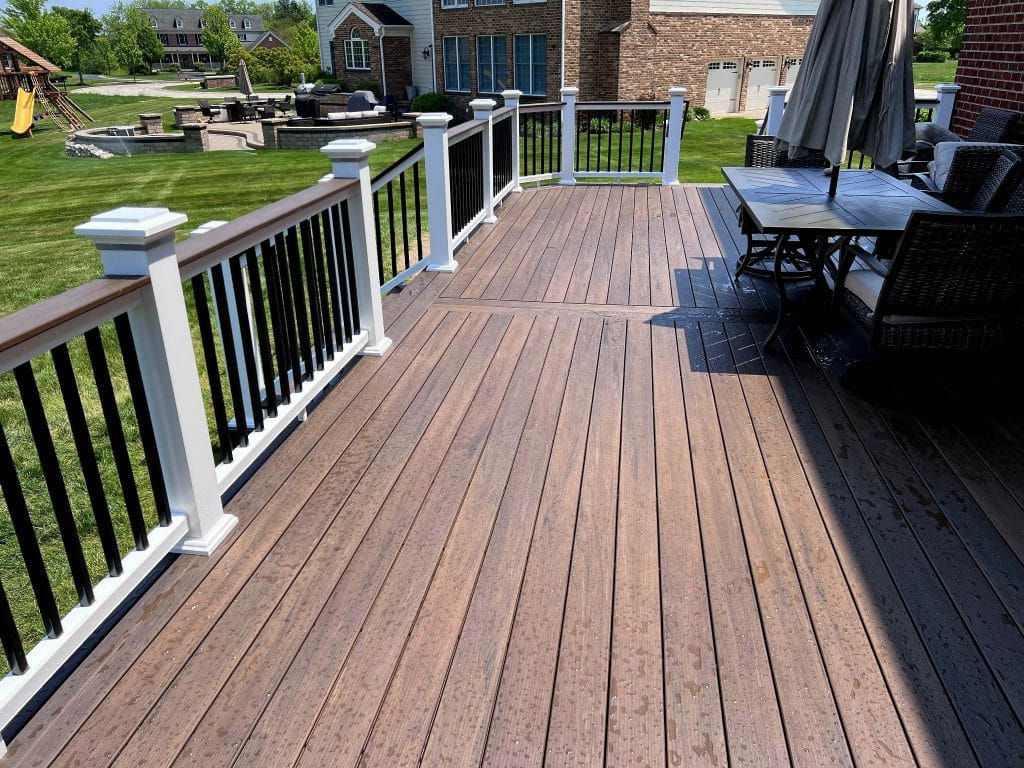
Enhanced Traction
When any surface gets wet, it will be slippery. Some composite decking has poor traction, but when comparing Mineral Based & PVC decking are top performers when it comes to enhanced traction.
Wide Variety of Color & Grain Patterns
Composite Decking offers a large variety of colors and wood grain patterns range with the different brands. Most composite decking brands offer grays, browns, reds, tans, a large variety of colors to choose from. Mix or Match, you can combine multiple color selections within the same decking collection to achieve a unique, personable look. Consider combining lightly colored deck boards bordered with darker tones for a dramatic look.
Environmentally Friendly
Composite decking is made up of recycled content. This varies by each manufacturer. Eco-friendly composite decking from Trex, for example, includes 95 percent recycled content, while some competitor’s products have only 80 percent recycled content.
No Splinters
With hazards like splintering, splitting, warping, and decay, damaged wood decking can jeopardize your family’s safety. Composite decking you no longer have to worry about these safety hazards.
No Painting or Staining
Painting and Staining every year is time consuming and is costly over the years! With composite you will be able to spend more time enjoying your deck where no painting or staining is needed.
Increased Design Options with Curved Decking
Tired of square or basic decks? Want to add some style with curved decking? You can do so with composite. Composite is a light material that allows the boards to be flexible when heating with proper equipment and technique by a professional. This also allows to create unique bends for patterns and inlays to create a one of kind deck.
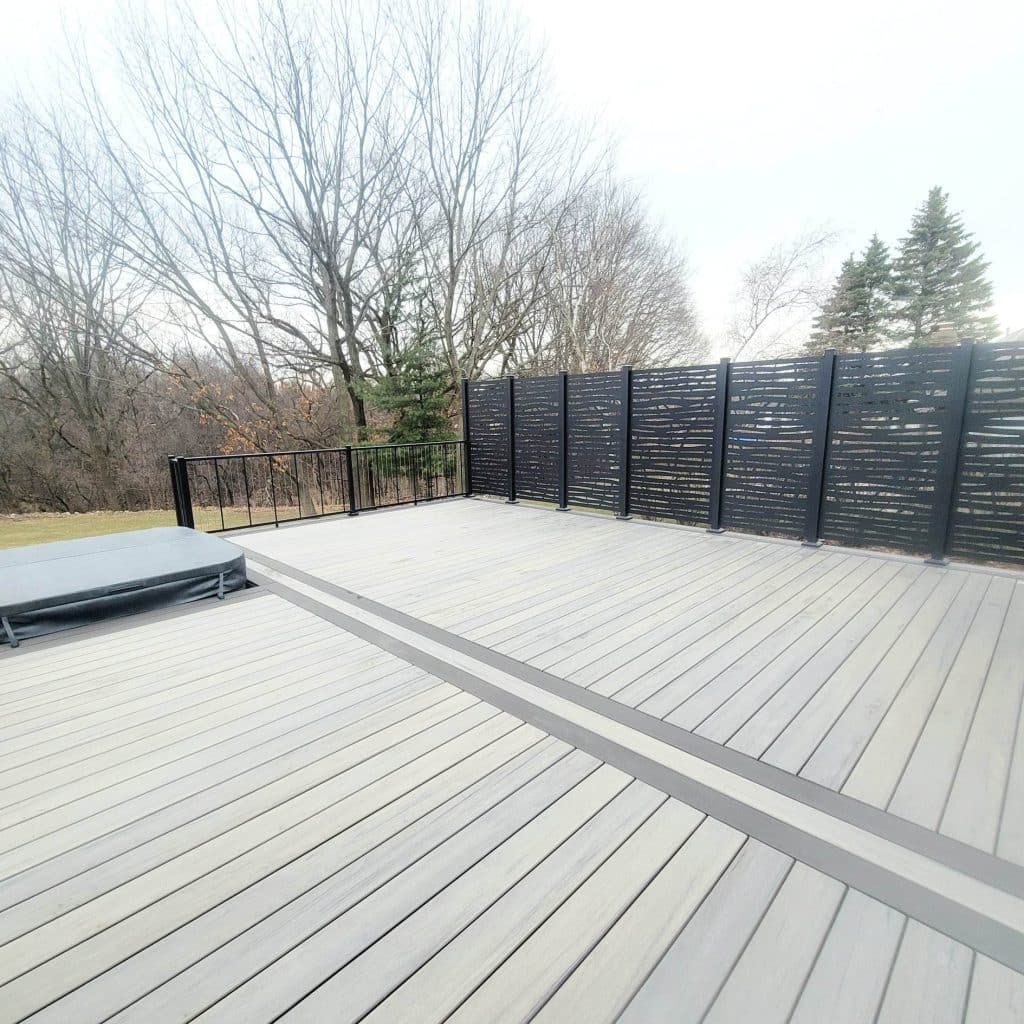
Longevity
Composite decking is meant to last. Choose a good quality composite and your deck will last a minimum of 25 years. Just as a lot of things, you get what you pay for is true when it comes to choosing your decking selections. The lower grade composites serve its purpose of low maintenance but just might not be as durable or aesthetically pleasing as a medium or high grade.
Long Term Warranties
The standard wood based composite decking warranty is 25 years. The higher end Mineral based composite or PVC decking offer up to 50 years.
Some manufacturers also include labor warranty, such as Deckorators with a 25 Year Removal & Replacement warranty.
Keep in mind, some decking manufacturers don’t offer any specific warranties and be aware some warranty claims are denied if not installed by a certified installer.
Limited Fading
While nothing is fade proof, most decking warranties guarantee composite decking not to fade no more than 5 Delta E. Any fading will happen with in the first few months and then will remain the same for its lifetime. Uncapped decking does not apply.
Cons
Higher Upfront Cost
This is where homeowners shy away from composite when they hear the cost. It comes to Upfront vs. Long term. Composite decking will often initially cost 4-6x as much as treated pine decking. This depends on the different decking selections you choose. In comparison over the span of 15 years with proper maintenance of a wood decking you will spend more and at the end of 15 years and will have to replace your deck. It costs around $700 to $2,000 on average to seal, stain, and repair a wood deck every 2 – 3 years.
Permanent Decking Color
This maybe a problem for some if you like to change your deck color every few years. The composite decking color is permanent and can only be changed by changing out the composite which would be costly. Painting composite decking is not recommended so be sure to choose a decking that you will love for the next 25 years.
Expansion and Contraction
Composite like all materials we use for just about everything is subject to expansion and contraction as it is exposed to different elements. There are a few different types of composites out there and each one is affected differently depending on the type and concentration of the materials used during the manufacturing process. Some composites such as Mineral Based Composite decking has very little thermal movement. Whereas a PVC has a lot of thermal movement from morning to afternoon.
Can be hot on your feet
One of the bigger complaints about composite is that it can be hot to the touch. How hot depends on colors, but also the composite. Lighter colors and PVC will be your cooler composites.
Requires Superior Substructure
Composite decking being a lighter material then wood decking, thus requires additional framing compared to traditional wood decks.
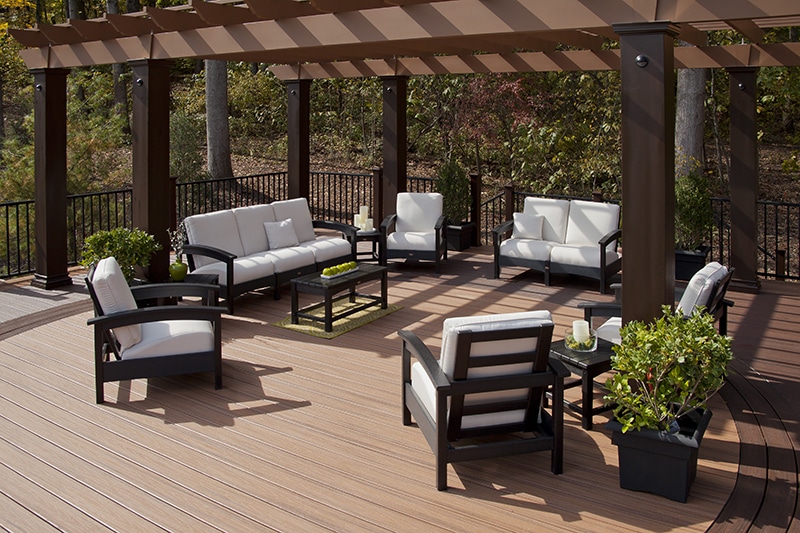
Can be Slippery When Wet
While they don’t have to worry about their decking absorbing the water and rotting, homeowners do need to be aware of the fact that this feature makes the boards more slippery than wood and other materials. If the water cannot be absorbed, it just sits on the surface of the deck making it slippery.
Some manufacturers offer a high-end alternative to their standard composite planks that performs with greater traction to prevent accidents and falls.
Top 3 Pros of Composite Decking
- Maintenance
- Hidden Fasteners
- Warranties
Top 3 Cons of Composite Decking
- Up front Cost
- Expansion and Contraction
- Hot of Feet
What Other Alternatives Are There?
Besides composite materials, PVC decking is another great decking material that’ll last even longer!
While composite decking is made of recycled plastics and wood fibers, PVC is made of recycled materials only – no wood at all.
Of course, this makes PVC decking some of the most expensive decking materials on the market.
What Are The Best Composite Decking Brands?
- Deckorators
- Timbertech
- Fiberon
https://www.google.com/maps?cid=2300364325239903716



